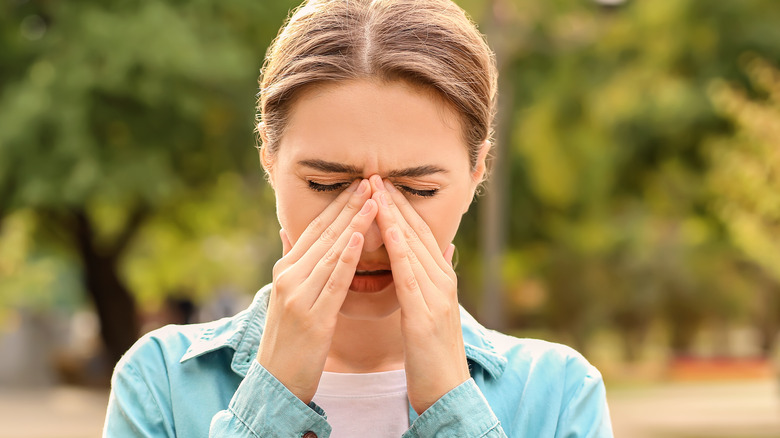How To Tell The Difference Between Allergies And A Cold
If you've ever woken up with the sniffles, you've probably wondered whether you're getting a cold or if you might be experiencing seasonal allergies. It can be tough to tell because both share similar symptoms and leave you feeling lousy. But there are a few key differences between the common cold and allergies.
The common cold is an infection caused by a virus that spreads from person to person (via Mayo Clinic). An allergy occurs when a person comes in contact with an allergen and their immune system overreacts. Common allergens include pollen, trees, and certain grasses.
"The cold is the most common illness known," according to the National Institutes of Health. Adults have an average of two to three colds each year, while children experience colds even more frequently (via Centers for Disease Control and Prevention). On the other hand, some 50 million Americans have allergies, according to the Asthma and Allergy Foundation of America. Since many people will likely be affected by the cold and allergies, it's important to take stock of the symptoms to properly treat them.
Allergy and cold symptoms
Itchy and watery eyes are a revealing sign of an allergy rather than the common cold (via Medical News Today). People with allergies can also develop a skin condition known as eczema in some cases, but this does not occur with a cold. While a sore throat can sometimes accompany allergies, it is more typical when a person has a common cold. With severe colds, people may develop a fever as a possible symptom, but it is never a symptom of an allergy, according to Medical News Today. Similarly, body aches are also associated with the common cold but not with allergies.
There is some overlap in symptoms, which makes telling the two apart a tough call. In some cases, people experience fatigue from a cold and allergies, according to the Mayo Clinic. Oftentimes people with a cold develop a cough, but it's less common for people with allergies.
Symptoms develop differently
If you want to know if you have the common cold or allergies, keep an eye on your calendar or watch. Symptoms of an allergy tend to appear quickly and almost "out of nowhere," according to Medical News Today. Signs of a common cold, however, tend to develop over the course of 24 to 48 hours.
The season can also be telling. Allergies tend to impact people around the same time each year (via Medical News Today). Seasonal allergies are more common in the spring, summer, and early fall. Colds spread more often during the winter and early spring months, but it isn't impossible to get sick outside of those months, according to the CDC.
Cold symptoms can last three to 10 days, although some colds last as long as two or three weeks. Allergies, on the other hand, can last several weeks, or, as long as a person is exposed to an offending allergen, according to the Mayo Clinic.
Both allergies and colds are treatable
Generally, people do not need to see a doctor if they have a cold, according to the Mayo Clinic. Treatment typically includes rest and over-the-counter remedies, such as decongestants, cough syrup, and pain relievers. Health experts also recommend drinking plenty of fluids, sipping warm liquids like soup, and using a humidifier if the air is dry.
Prevention is often the main course of action to treat allergies, according to Medical News Today. This is done by identifying what is causing a person's allergies and finding ways to avoid them. When that's not an option, however, over-the-counter drugs, prescription antihistamines, nasal steroid sprays, and decongestants are sometimes needed, according to the Mayo Clinic.
In some cases, doctors will prescribe what's known as allergy shots, which involve introducing a small dose of an allergy over several months (via WebMD). The goal of the treatment is to build the body's tolerance to an allergen with the goal of providing long-term relief.




